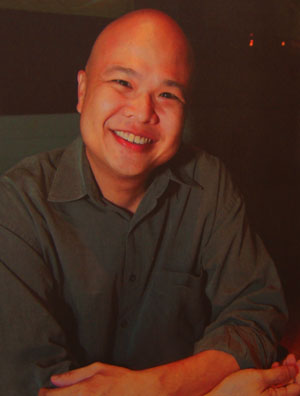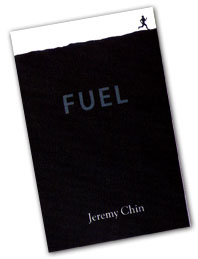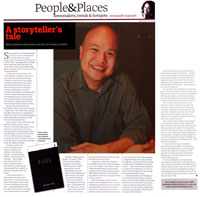
Reviews: The Edge (17 April, 2011)

A storyteller's tale
What fueled an advertising man into becoming an author
Some people are fortunate enough to be born writers. On the other end of the spectrum, some people make it as famous, drool-worthy Pullitzer Prize-winning writers through sheer hard work. And then there are some writers whose storytelling skills get knocked into their heads by a stroke of pure good luck.
Local author Jeremy Chin is one such example. A small accident in his secondary school metal workshop resulted in a permanent personality change in the quiet boy who used to play competitive chess in primary school. From a knock on the head, thanks to a flying piece of metal, emerged a young man overflowing with stories and ideas. Ignoring textbooks and skipping lessons, friends would surround this modern-day Penglipur Lara to listen to fables and tales that were far removed from their own lives.
 But for Chin, the journey from storyteller to author was not as simple as it might seem. Chin's life would meander through a wide variety of experiences before the notion to write anything down would materialize. It finally has, in the form of a book entitled Fuel.
But for Chin, the journey from storyteller to author was not as simple as it might seem. Chin's life would meander through a wide variety of experiences before the notion to write anything down would materialize. It finally has, in the form of a book entitled Fuel.
Set in London, Fuel is about Timothy Malcolm Smith, a young creative director at an advertising agency who harbours a secret dream of not just participating but also winning the New York Marathon. Training from the time he was a child yet never running in competitions, Smith's dream is to arrive in The Big Apple unannounced and take home the winner's trophy.
If reviews of the book are to be believed, Fuel is a life-changing and cathartic read, the kind of book—much like Paulo Coelho's The Alchemist, for example—that changes you as you read it. The author's own journey of self-discovery, told through the moving of the character in the book, resonates with the reader.
A successful career in advertising is the price Chin paid for Fuel—it was one or the other. But the idea to even write it came in a Hollywood-worthy way—Chin questioned his own mortality and the way he would be remembered when he was dead.
"I was just thinking about my life," he begins, "Prior to this I was in a digital ad agency. I was happy there and all that, I didn't regret going to work oon Mondays. Just that I started contemplating my final moments on earth and I started thinking about how I would be remembered once I was gone." Dissatisfied with the image that came to mind, Chin embarked on a soul-searching journey that would determine the way he spent the rest of his life.
"I had three criteria that needed to be fulfilled at this new thing I was going to do," he explains. "First, I had to enjoy doing this new thing. Second, I had to be good at it. And third, it had to pay the bills. When I looked at my criteria and my passion for the arts, writing seemed the best option."
Chin had already noticed that the literary scene in Malaysia was not very friendly to local fiction writers in that we tend to gravitate towards local writers only for non-fiction and factual stuff and go to foreign writers when we want to be entertained. This understanding changed the direction Chin's writing would take. "I knew lah there is no way I could make it in Malaysia as a fiction writer—unless I wrote about feng shui or how to be a millionaire. So I set out with the knowledge that I was writing for an international market."
Competing with the J.K. Rowlings of the world was intimidating to say the least, but Chin had set his sights on being better than her and writers in her ilk in order to stand out. His little ambition seems a little far-fetched until you realize that driven by ambition, Chin has already written his book.
 He took a risk many of us only dream of and embraced a new full-time job—writing a book. For two years, Chin would spend 14 hours a day writing. According to him, the weekends spent with family turned into an obligation as he longed to get back to work once Monday rolled around—his writing was his oasis, his panacea.
He took a risk many of us only dream of and embraced a new full-time job—writing a book. For two years, Chin would spend 14 hours a day writing. According to him, the weekends spent with family turned into an obligation as he longed to get back to work once Monday rolled around—his writing was his oasis, his panacea.
The storyline had materialized a long time ago, as had the setting for the book. Chin was inspired by the story of a mother summoning the strength to lift a car that was crushing her son and he liked the idea that the love for another could overcome the laws of science.
The central concept was born but the vehicle for Fuel is marathon running. "For marathon runners, what is very important is energy conservation, the fuel for their run," says Chin. "I started to wonder what would happen when that fuel ran out and if you could run on pure determination. That's why the book is called what it is."
Chin couldn't place fuel in a local setting as he had been away from the country for almost 12 years, hence it didn't seem natural. His experiences in London, Chin says, were fresher in his mind and also contributed to the story in many other ways. The protagonist of the book grew up approaching running from a scientific perspective and set his sights on what he considered to be the ultimate race—The New York Marathon.
Fuel proves to be an easy read and informative and manages to be inspiring without being preachy. It is riveting and there is this sense of anticipation as the protagonist works towards achieving his lifelong dream and learning many other lessons along the way.
There are definitely more books that Chin wants to write but he will only pursue them only if his first book does well. While this is hardly reason enough to go out and buy the book, we do owe it to ourselves to support a fledging group of local authors who need, just as much as any other writer, a chance to present their work.
Fuel is available at Kinokuniya KLCC, MPH Bookstores and Silverfish Books. To contact the writer, email good2bbald@yahoo.com.
 |
| View actual article (PDF) |